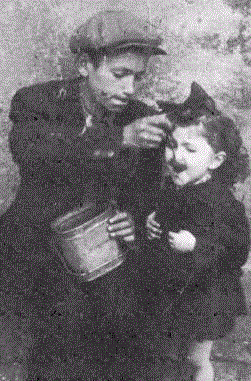 Day 10: Paid to Leave!
Day 10: Paid to Leave!
The struggle to feed himself does not take precedence. This Young Jewish Man has learned the Charitable nature from within and secures a further moment from Hunger for His Little Sister is gained. We will know their suffering only when Hunger and Torment touch us on an individual level. Can we ever know its potency on such a personal level?
1931 August 19th. German Agreement is reached in Basle, between Hitler’s regime represented by Heinrich Bruening and a grouping of Allied Finance Ministers. A sum of 2,000 Reichsmarks will be paid to those Jews emigrating to Palestine.
This ‘agreement’ would lead to The Ha’avarah Agreement which would allow for German Jewry to transfer personal funds to Palestine. Also agreed was, that between 12,500 Reichsmarks and 15,000 Reichsmarks would be payable to those Families who chose to leave for Palestine as a Family unit! The Agreement was not rescinded immediately upon Hitler’s accession of Power, but persisted until 1935. The agreement did not take into account, the struggle that would be left behind.
1939 August 19th. the Romanian Jewish refugee ship Rim runs aground.
All routes out of harms way for the Jews under direct German threat have their own hazards as the 600 Jews aboard this refugee ship have found out. Escape for many is impossible, Family ties, commitments of all sorts, and while borders are continually being closed to the Jews within Europe, Palestine is an option much nearer than the Americas.
1940 August 19th. Otto Abetz proposes deportation of stateless Jews to Vichy.
The German Ambassador to Paris has his finger on the pulse of Hitler’s demands for the Jews of France. While all efforts to remove the Jews of France are made, and this is toward an eventual destruction, they have not been finalised. However, it is the preferred option to have the Jews of France removed from German control, until that need to destroy them is met!
1941 August 19th. With over 3,000 Mogilev Jews murdered this day, this will all add toward a total of more than 18,000 of Mogilev’s Jews eventually murdered. Elsewhere more than 640 of Ukmerge’s Jewish Men, Women and Their Children are murdered while almost 100 Jewish Children of Bjala-Zerkow are murdered. Don’t allow these accounts to confound You. They are meant to attribute a concern that was so clearly missing from their presence as they were being led toward Destruction. As the War in the East progresses, the Wehrmacht, with der Einsatzgruppe close on their heels, defeats Russian forces before the gates of Kiev.
“..officer personnel was furnished by ..State Police ..Kripo ..SD. ..Waffen SS ..Ordnungspolizie. ..State Police ..Kripo furnished most of ..experts ..troops were furnished by ..Waffen SS and ..Ordungspolzei. ..Waffen SS and ..Ordungspolzei were each supposed to supply ..Einsatzgruppe with one company.” Otto Ohlendorf.
The progress of the Slaughter takes on newer excesses as Children are brought into the equation. German cohorts, whether they be SS, Waffen SS, Wehrmacht or der Einsatzgruppe, balked at the idea of Murdering Children, but that was merely a logistical consideration, and only initially. The momentum of the Slaughter was soon escalated and brought to bear upon all Jewish Children, no matter what their Age might be!
1942 August 19th. Jewish Resistance occurs in Otwock where 14,000 Jews will be murdered. Elsewhere 1,000 of Rembertow’s Jews are murdered. 6,000 of Lvov’s Jews are transported in 45 Cattle Cars to Belzec.
Kurt Gerstein is on hand with his Gassing and Cleansing expertise and affords the world the first evidence of the Belzec Murder operation. As he witnesses the arrival of Lvov’s Jews, he is seemingly thrown into doubt over Hitler’s policy as it pertains to ritual slaughter of human beings. These Lvov Jews are soon gassed, dispatched in great haste and all to prove the growing effectiveness of the mechanisation of The Murder Process!
“..between June 1941 to June 1942 ..Einsatzkommandos reported ninety thousand people liquidated.” Otto Ohlendorf.
A Book a Day, or so of suggested reading!
12. Lengyel, Olga Five Chimneys: The Story of Auschwitz.

